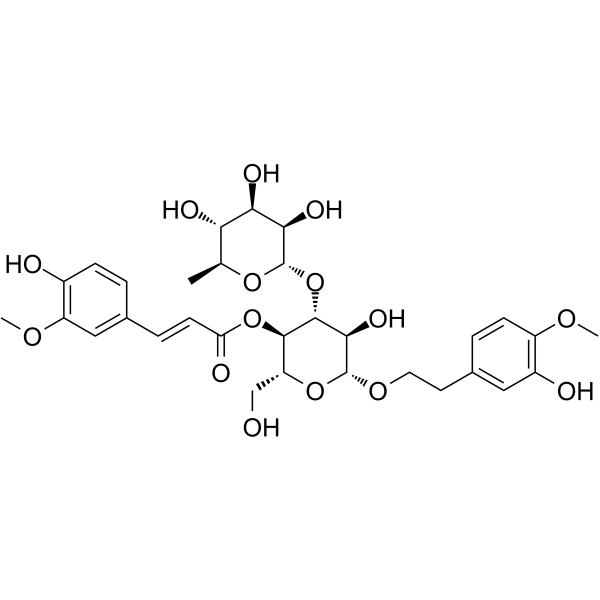
Martynoside
CAS No. 67884-12-2
Martynoside( —— )
Catalog No. M31043 CAS No. 67884-12-2
Martynoside is a natural selective estrogen receptor modulator, which has antioxidative, anti-muscle fatigue, anticancer and antimetastatic activities.
Purity : >98% (HPLC)
 COA
COA
 Datasheet
Datasheet
 HNMR
HNMR
 HPLC
HPLC
 MSDS
MSDS
 Handing Instructions
Handing Instructions
| Size | Price / USD | Stock | Quantity |
| 5MG | 718 | In Stock |


|
| 50MG | Get Quote | In Stock |


|
| 100MG | Get Quote | In Stock |


|
Biological Information
-
Product NameMartynoside
-
NoteResearch use only, not for human use.
-
Brief DescriptionMartynoside is a natural selective estrogen receptor modulator, which has antioxidative, anti-muscle fatigue, anticancer and antimetastatic activities.
-
DescriptionMartynoside is a natural selective estrogen receptor modulator, which has antioxidative, anti-muscle fatigue, anticancer and antimetastatic activities. Martynoside has the potential of antagonizing sports anaemia, the mechanism of this effect might be related to preventing RBC from free radical damage.
-
In Vitro——
-
In Vivo——
-
Synonyms——
-
PathwayOthers
-
TargetOther Targets
-
Recptor——
-
Research Area——
-
Indication——
Chemical Information
-
CAS Number67884-12-2
-
Formula Weight652.7
-
Molecular FormulaC31H40O15
-
Purity>98% (HPLC)
-
SolubilityIn Vitro:?DMSO : 25 mg/mL (38.31 mM)
-
SMILES——
-
Chemical Name——
Shipping & Storage Information
-
Storage(-20℃)
-
ShippingWith Ice Pack
-
Stability≥ 2 years
Reference
molnova catalog



related products
-
1-Cyclohexyl-3-dodec...
1-Cyclohexyl-3-dodecyl urea is a highly selective soluble epoxide hydrolase (sEH)?inhibitor.
-
Idactamab
Idactamab (INT-001) is a monoclonal antibody to the human amino acid transport protein ASCT2.
-
EMD638683
EMD638683a novel SGK inhibitor with antihypertensive potency(with an IC50 of 3 μM).



 Cart
Cart
 sales@molnova.com
sales@molnova.com


